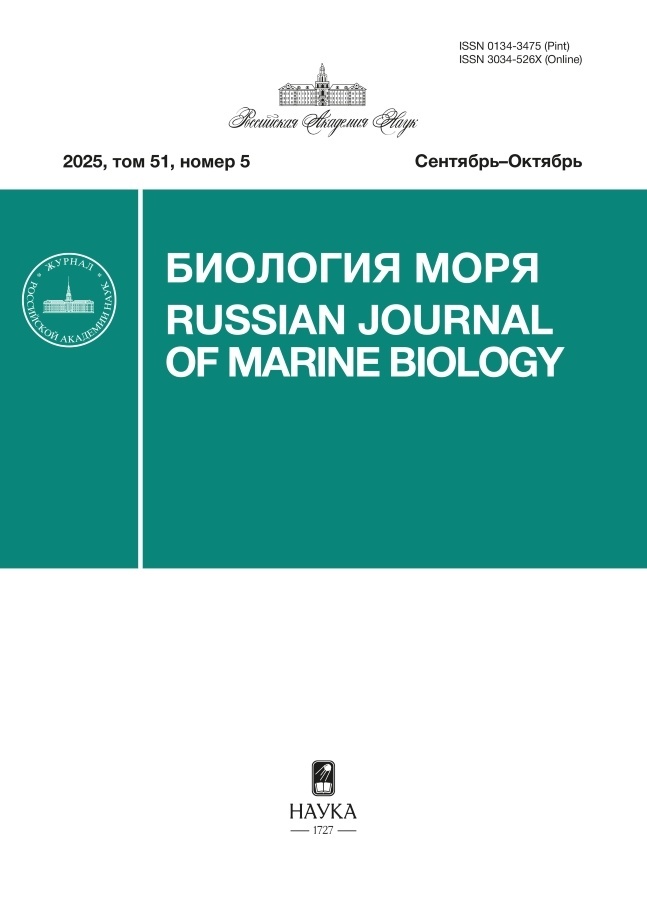Intravital genotyping of Japanese sea cucumber, Apostichopus japonicus (Selenka, 1867) (Echinodermata: Holothuroidea), for aquaculture and population genetics studies
- Авторлар: Yagodina V.D.1,2, Brykov V.A.1
-
Мекемелер:
- Zhirmunsky National Scientific Center of Marine Biology, Far Eastern Branch, Russian Academy of Sciences
- Institute of the World Ocean, Far Eastern Federal University
- Шығарылым: Том 51, № 5 (2025)
- Беттер: 262-267
- Бөлім: ОРИГИНАЛЬНЫЕ СТАТЬИ
- ##submission.datePublished##: 15.09.2025
- URL: https://journals.eco-vector.com/0134-3475/article/view/696603
- DOI: https://doi.org/10.31857/S0134347525050032
- ID: 696603
Дәйексөз келтіру
Аннотация
DNA extraction of Japanese sea cucumber, Apostichopus japonicus (Selenka, 1867), was performed from the tube feet and from the longitudinal muscle band as a control. DNA isolated from the tube feet was of a high quality and suitable for further molecular genetics studies. The opportunity to obtain genetic material from a living individual opens up new prospects for population monitoring, release of individuals back to the environment, and selection of aquatic organisms with high polymorphism for breeding in aquaculture.
Негізгі сөздер
Авторлар туралы
V. Yagodina
Zhirmunsky National Scientific Center of Marine Biology, Far Eastern Branch, Russian Academy of Sciences; Institute of the World Ocean, Far Eastern Federal University
Email: iagodinavd@gmail.com
Vladivostok, 690041 Russia; Vladivostok, 690022 Russia
V. Brykov
Zhirmunsky National Scientific Center of Marine Biology, Far Eastern Branch, Russian Academy of SciencesVladivostok, 690041 Russia
Әдебиет тізімі
- Гаврилова Г.С. Товарное выращивание дальневосточного трепанга. Владивосток: ТИНРО-центр. 2013. 99 с.
- Adachi K., Okumura S.I., Moriyama S. Genetic structure of Japanese sea cucumbers (Apostichopus japonicus) along the Sanriku coast supports the effect of earthquakes and related tsunamis // Genetica. 2018. V. 146. № 6. P. 497–503.
- Arafa S., Sadok S., El Abed A. Assessment of magnesium chloride as an anaesthetic for adult sea urchins (Paracentrotus lividus): incidence on mortality and spawning // Aquacult. Res. 2007. V. 38. P. 1673–1678.
- Chen L., Li Q., Yang J. Microsatellite genetic variation in wild and hatchery populations of the sea cucumber (Apostichopus japonicus Selenka) from northern China // Aquacult. Res. 2008. V. 39. P. 1541–1549.
- Chen M., Gao L., Zhang W. et al. Identification of forty-five gene-derived polymorphic microsatellite loci for the sea cucumber, Apostichopus japonicus // J. Genet. 2013. V. 92. P. e31–e35. http://www.ias.as.in/jgenet/OnlineResources/92/e31.pdf. https://doi.org/10.1007/s12041-013-0234-2
- Crespi-Abril A.C., Rubilar T. Ethical considerations for echinoderms: new initiatives in welfare // Animals (Basel). 2023. V. 13. Art. ID3377.
- Edgar R.C. MUSCLE: a multiple sequence alignment method with reduced time and space complexity // BMC Bioinform. 2004. V. 5. Art. ID113.
- Furlan E., Stoklosa J., Griffiths J. et al. Small population size and extremely low levels of genetic diversity in island populations of the platypus, Ornithorhynchus anatinus // Ecol. Evol. 2012. V. 2. № 4. P. 844–857.
- Kang J.-H., Kim Y.-K., Kim M.-J. et al. Genetic differentiation among populations and color variants of sea cucumbers (Stichopus japonicus) from Korea and China // Int. J. Biol. Sci. 2011. V. 7. № 3. P. 323–332.
- Kanno M., Li Q., Kijima A. Isolation and characterization of twenty microsatellite loci in Japanese sea cucumber (Stichopus japonicus) // Mar. Biotechnol. 2005. V. 7. P. 179–183.
- Liao M., Wang Y., Rong X. et al. Development of new microsatellite DNA markers from Apostichopus japonicus and their cross-species application in Parastichopus parvimensis and Pathallus mollis // Int. J. Mol. Sci. 2011. V. 12. P. 5862–5870.
- Madeira P., Stefanni S., Ávila S.P. Non-destructive tissue sampling and the use of PCR-RFLPs in two edible sea cucumbers from the north-eastern Atlantic, Holothuria mammata Grube, 1840 and H. sanctori Delle Chiaje, 1823 (Echinodermata: Holothuroidea) // Eur. Zool. J. 2018. V. 85. № 1. P. 89–94.
- Method for extracting DNA by echinoderm living body sampling. https://patents.google.com/patent/CN101168760A/en
- Nowland S.J., Jerry D.R., Southgate P.C. A non-destructive tissue sampling technique for holothurians to facilitate extraction of DNA for genetic analysis // Invertebr. Biol. 2015. V. 134. № 3. P. 252–259.
- Oh G.-W., Ko S.-C., Lee D.H. et al. Biological activities and biomedical potential of sea cucumber (Stichopus japonicus): a review // Fish. Aquat. Sci. 2017. V. 20. Art. ID28.
- Peakall R., Smouse P.E. GenAlEx 6.5: Genetic Analysis in Exel. Population genetic software for teaching and research – an update // Bioinformatics. 2012. V. 28. № 19. P. 2537–2539.
- Peng W., Bao Z.M., Du H.X. et al. Development and characterization of 70 novel microsatellite markers for the sea cucumber (Apostichopus japonicus) // Genet. Mol. Res. 2012. V. 11. № 1. P. 434–439.
- Rozas J., Ferrer-Mata A., Sánchez-DelBarrio J.C. et al. DnaSP 6: DNA Sequence Polymorphism analysis of large datasets // Mol. Biol. Evol. 2017. V. 34. № 12. P. 3299–3302.
- Shangguan J., Li Z. Development of novel microsatellite markers for Holothurian scabra (Holothuriidae), Apostichopus japonicus (Stichopodidae) and cross-species testing in other sea cucumbers // Chin. J. Oceanol. Limnol. 2018. V. 36. P. 519–527.
- Soliman T., Kanno M., Kijima A., Yamazaki Y. Population genetic structure and gene flow in the Japanese sea cucumber Apostichopus japonicus across Toyama Bay, Japan // Fish. Sci. 2012. V. 78. P. 775–783.
- Sulardiono B., Hartoko A., Aini A.N. et al. Genetic diversity of commercial sea cucumbers Stichopus (Echinoderm: Stichopodidae) based on DNA Barcoding in Karimunjawa, Indonesia // Biodiversitas. 2022. V. 23. № 2. P. 922–927.
- Tamura K., Stecher G., Kumar S. MEGA11: Molecular Evolutionary Genetics Analysis version 11 // Mol. Biol. Evol. 2021. V. 38. P. 3022–3027.
- Technelysium DNA Sequencing Software. South Brisbane, Australia. https://technelysium.com.au
- Wei J.-L., Cong J.-J., Sun Z.-H. et al. A rapid and reliable method for genetic sex identification in sea cucumber, Apostichopus japonicus // Aquaculture. 2021. V. 543. Art. ID737021.
- Yan J., Jing J., Mu X. et al. A genetic linkage map of the sea cucumber (Apostichopus japonicus) based on microsatellites and SNPs // Aquaculture. 2013. V. 404–405. P. 1–7.
Қосымша файлдар








